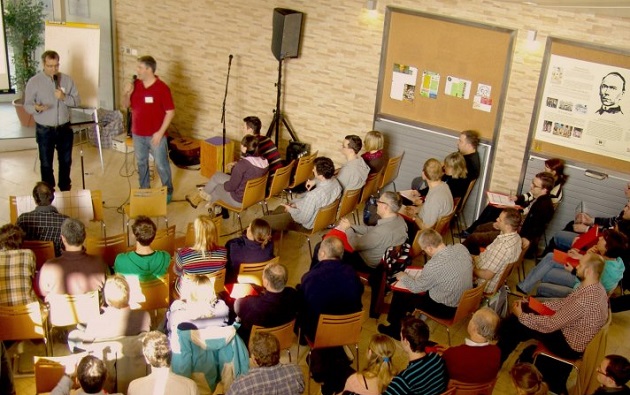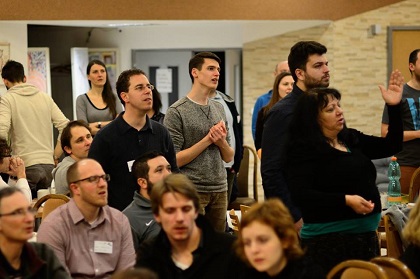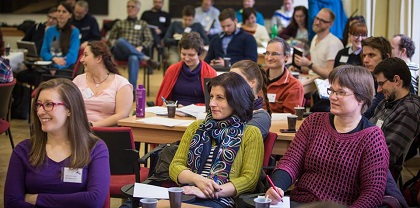A survey conducted by the Czech Evangelical Alliance also asked evangelical church members about sexuality, refugees and divorce.
 A church meeting in the Czech Republic. / Photo: Czech Evangelical Alliance
A church meeting in the Czech Republic. / Photo: Czech Evangelical Alliance
In 2017, the Czech Evangelical Alliance expanded its ongoing experiment in survey research with a survey of Czech Evangelical Christians.
Church members were asked questions about core Christian beliefs, religious practice, moral and social issues.
The results of the survey are summarized in a report by Czech sociologist Dr. Dana Hamplová. Her full report will be available through the Czech Evangelical Alliance website soon after the Czech Evangelical Forum in February, 2018. In the meantime, Evangelical Focus can report about some of the main results.
First, it can be said that Czech evangelical Christianity is alive and well. Survey respondents tended to be younger and more highly educated when compared to the expected demographics of Czech Christianity based on the most recent census data.
 Attendees to a training event. / Czech Evangelical Alliance
Attendees to a training event. / Czech Evangelical AllianceWhen asked about Christian doctrines, 93% of respondents indicated a strong or fairly strong belief in God as a personal being, 99% believed in the existence of heaven, and 94% believed in the existence of hell.
THE BIBLE
When it came to thetole of Scripture, 98.5% agreed that the Bible is the Word of God. There was some significant disagreement over whether or not the Bible can be taken literally, but some of this can be accounted for by limitations in some of the survey questions.
Only about 40% of respondents indicated that they read the Bible on a daily basis. There were some interesting trends when this question was placed in the context of a higher or lower view of the authority of Scripture, as well as quite wide variation between denominations.
The figure almost doubles when those who read the Bible at least a few times a week are included, meaning that ultimately to close to 80% of the respondents are reading the Bible on a regular basis.
PRAYER AND SALVATION
Over 75% of respondents indicated that they pray daily. There seems to have been significant hesitation about praying with Roman Catholics and inviting non-Christians to pray.
Also, while a majority (70%) agreed that only Christianity leads to eternal life and only 3% indicated a belief that some non-Christian religions can lead to eternal life, almost 27% of respondents were not sure about this question.
EVANGELISM
Just under half (49%) of the respondents indicated that they try to talk about God with unbelievers at least once a month.
 Attendees to a training event. / Czech Evangelical Alliance
Attendees to a training event. / Czech Evangelical AllianceThis is perhaps a somewhat challenging figure when one takes into account that the survey respondents are likely to be some of the most active Evangelical church members. Just over 17% indicated that they try to talk with unbelievers about God at least once a week.
MIGRATION AND ISLAM
A variety of other interesting data emerged regarding ethics and other social and moral issues. More respondents favored limited immigration and access to the Czech Republic than open borders, with 92% indicating belief that Moslem immigrants are a threat to the country.
SEXUALITY
Over 99% of respondents agreed that it is wrong for a married man or woman to have sex outside of their marriage relationship, although only 68% fully agreed that sex before marriage is wrong.
About 90% agreed that sexual relations between members of the same sex is wrong. Respondents seemed to be somewhat surprisingly open to divorce.
They were less open to abortion, with younger people being the most opposed.
And perhaps no surprise, people in the large city of Prague seemed to be more liberal in their views than people in the smaller cities, towns and rural areas.
A CZECH EVANGELICAL ALLIANCE SURVEY
While this survey has its limitations, it is an interesting look into the current Evangelical Church in the Czech Republic, and has been a successful step forward in the Czech Evangelical Alliance‘s ongoing experiments with survey research.
Look for the full report to be available in both Czech and English after 22 February on the website of the Czech Evangelical Alliance.

Las opiniones vertidas por nuestros colaboradores se realizan a nivel personal, pudiendo coincidir o no con la postura de la dirección de Protestante Digital.
Si quieres comentar o